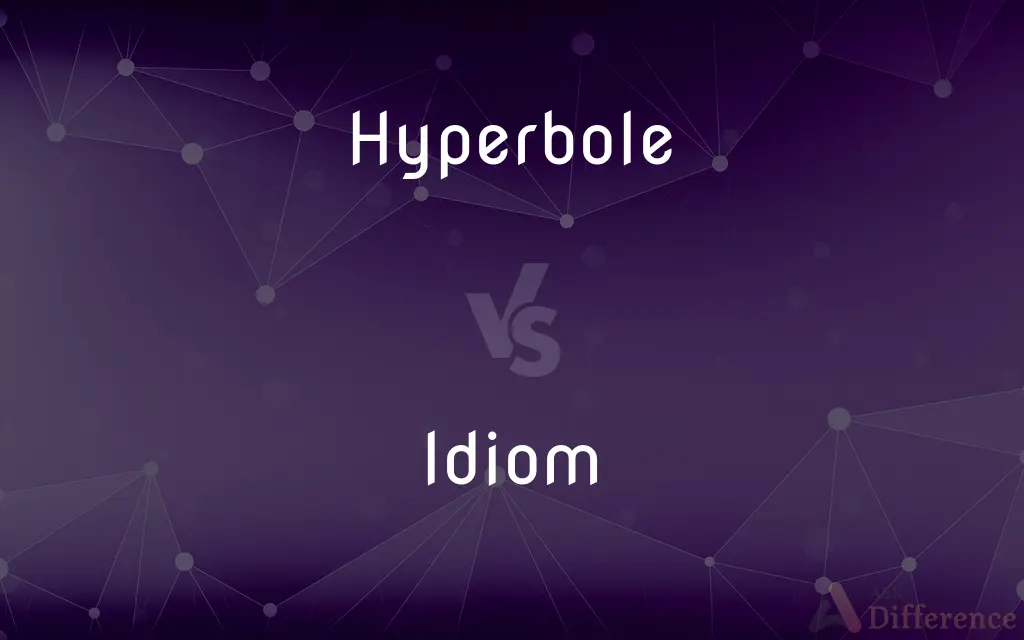Hyperbole vs. Idiom — What's the Difference?
By Tayyaba Rehman — Updated on September 20, 2023

Difference Between Hyperbole and Idiom
Table of Contents
ADVERTISEMENT
Key Differences
Hyperbole is a rhetorical device frequently utilized to provide emphasis or convey strong emotions. It intentionally magnifies situations or emotions beyond reality. For instance, saying "I'm so hungry I could eat a horse" doesn't imply one would genuinely consume a horse but emphasizes intense hunger.
On the contrary, Idiom refers to a set expression or a phrase that doesn't necessarily mean the literal sum of its parts. When someone says "break a leg" in the theater, they don't wish harm; instead, it's a means of saying "good luck." It's a peculiar construct where the intended meaning isn't derived from individual words in the phrase.
Hyperbole leans on dramatic exaggeration for effect. It doesn't aim for literal interpretation but hopes to create a vivid picture in the audience's mind. This figurative tool is common in both everyday speech and literature to convey emphasis or humor.
Idiom, meanwhile, is deeply rooted in cultural or linguistic conventions. It's a phrase where traditional usage dictates the meaning, often puzzling to non-native speakers. It's the cultural context and historical usage that give an Idiom its meaning, not the direct translation of its content.
In summary, while both Hyperbole and Idiom belong to the realm of figurative language, they serve distinct purposes. Hyperbole exaggerates for emphasis, while the meaning of an Idiom is anchored in conventional usage, separate from its literal components.
ADVERTISEMENT
Comparison Chart
Definition
Exaggerated statement for emphasis.
Phrase with a unique meaning from its components.
Purpose
To emphasize or create humor.
Convey a specific meaning based on convention.
Interpretation
Not meant to be taken literally.
Meaning isn't derived from literal translation.
Examples
"I've told you a million times."
"It's raining cats and dogs."
Usage
Common in daily language and literature.
Deeply cultural; can be confusing to outsiders.
Compare with Definitions
Hyperbole
Exaggeration used for emphasis or effect.
She's so fast, she must have lightning in her shoes.
Idiom
Often stems from historical or cultural contexts.
Don't count your chickens before they hatch.
Hyperbole
A figure of speech that amplifies.
I've waited for this moment for an eternity.
Idiom
Cannot be understood by direct translation.
She spilled the beans about the surprise.
Hyperbole
Not intended to be taken literally.
I'm so tired I could sleep for a century.
Idiom
Conveys meaning beyond individual words.
Let's touch base next week.
Hyperbole
Common in both everyday conversation and literature.
His suitcase weighed a ton.
Idiom
A phrase with a culturally specific meaning.
He's feeling under the weather today.
Hyperbole
Hyperbole (, listen) (adjective form hyperbolic, listen) is the use of exaggeration as a rhetorical device or figure of speech. In rhetoric, it is also sometimes known as auxesis (literally 'growth').
Idiom
Requires knowledge of the language's nuances.
I'm walking on eggshells around him.
Hyperbole
Exaggerated statements or claims not meant to be taken literally
He vowed revenge with oaths and hyperboles
You can't accuse us of hyperbole
Idiom
An idiom is a phrase or expression that typically presents a figurative, non-literal meaning attached to the phrase; but some phrases become figurative idioms while retaining the literal meaning of the phrase. Categorized as formulaic language, an idiom's figurative meaning is different from the literal meaning.
Hyperbole
A figure of speech in which exaggeration is used for emphasis or effect, as in I could sleep for a year or This book weighs a ton.
Idiom
A group of words established by usage as having a meaning not deducible from those of the individual words (e.g. over the moon, see the light).
Hyperbole
Deliberate or unintentional overstatement, particularly extreme overstatement.
Idiom
A characteristic mode of expression in music or art
They were both working in a neo-impressionist idiom
Hyperbole
(countable) An instance or example of such overstatement.
Idiom
A speech form or an expression of a given language that is peculiar to itself grammatically or cannot be understood from the individual meanings of its elements, as in keep tabs on.
Hyperbole
A hyperbola.
Idiom
The specific grammatical, syntactic, and structural character of a given language.
Hyperbole
A figure of speech in which the expression is an evident exaggeration of the meaning intended to be conveyed, or by which things are represented as much greater or less, better or worse, than they really are; a statement exaggerated fancifully, through excitement, or for effect.
Our common forms of compliment are almost all of them extravagant hyperboles.
Somebody has said of the boldest figure in rhetoric, the hyperbole, that it lies without deceiving.
Idiom
Regional speech or dialect.
Hyperbole
Extravagant exaggeration
Idiom
A specialized vocabulary used by a group of people; jargon
Legal idiom.
Hyperbole
Often used to convey strong feelings.
I'm dying of laughter.
Idiom
A style of artistic expression characteristic of a particular individual, school, period, or medium
The idiom of the French impressionists.
The punk rock idiom.
Idiom
A manner of speaking, a mode of expression peculiar to a language, language family, or group of people.
In English, idiom requires the indefinite article in a phrase such as "she's an engineer", whereas in Spanish, idiom forbids it.
Some of the usage prescriptions improved clarity and were kept; others that yielded discordant violations of idiom were eventually revised.
Idiom
(programming) A programming construct or phraseology that is characteristic of the language.
Idiom
A language or language variety; specifically, a restricted dialect used in a given historical period, context etc.
In the idiom of the day, they were sutlers, although today they'd probably be called vendors.
Idiom
An established phrasal expression whose meaning may not be deducible from the literal meanings of its component words.
She often spoke in idioms, pining for salad days and complaining about pots calling the kettle black.
Idiom
An artistic style (for example, in art, architecture, or music); an instance of such a style.
The idiom of the expressionists
Idiom
The syntactical or structural form peculiar to any language; the genius or cast of a language.
Idiom may be employed loosely and figuratively as a synonym of language or dialect, but in its proper sense it signifies the totality of the general rules of construction which characterize the syntax of a particular language and distinguish it from other tongues.
By idiom is meant the use of words which is peculiar to a particular language.
He followed their language [the Latin], but did not comply with the idiom of ours.
Idiom
An expression conforming or appropriate to the peculiar structural form of a language.
Some that with care true eloquence shall teach,And to just idioms fix our doubtful speech.
Idiom
A combination of words having a meaning peculiar to itself and not predictable as a combination of the meanings of the individual words, but sanctioned by usage; as, an idiomatic expression; less commonly, a single word used in a peculiar sense.
It is not by means of rules that such idioms as the following are made current: "I can make nothing of it." "He treats his subject home." Dryden. "It is that within us that makes for righteousness." M. Arnold.
Sometimes we identify the words with the object - though by courtesy of idiom rather than in strict propriety of language.
Idiom
The phrase forms peculiar to a particular author; as, written in his own idiom.
Every good writer has much idiom.
Idiom
Dialect; a variant form of a language.
Idiom
A manner of speaking that is natural to native speakers of a language
Idiom
The usage or vocabulary that is characteristic of a specific group of people;
The immigrants spoke an odd dialect of English
He has a strong German accent
Idiom
The style of a particular artist or school or movement;
An imaginative orchestral idiom
Idiom
An expression whose meanings cannot be inferred from the meanings of the words that make it up
Common Curiosities
Can Hyperbole be negative?
Absolutely. Hyperbole can exaggerate negative feelings, like "This is the worst day ever."
Are Hyperboles factual?
No, Hyperboles aren't factual; they're exaggerations meant for effect, not to be taken literally.
Why are Idioms hard for language learners?
Idioms' meanings aren't literal, making them tricky for those unfamiliar with the cultural context.
Can Hyperbole be used in formal writing?
While Hyperbole is common in creative writing, it should be used sparingly in formal contexts.
Can an Idiom's meaning change over time?
Yes, like other language elements, the meaning or usage of an Idiom can evolve.
Can Hyperbole be visual, not just linguistic?
Yes, visual representations, like in cartoons, can use exaggerated features as a form of Hyperbole.
Is Hyperbole always an overstatement?
Yes, Hyperbole always involves exaggeration for emphasis or humor.
Are Idioms universal across languages?
No, Idioms are often language-specific and might not have direct equivalents in other languages.
Is every exaggeration a Hyperbole?
Not necessarily. Hyperbole is a deliberate, often humorous exaggeration for rhetorical effect.
Why are Idioms culturally significant?
Idioms often arise from historical or cultural events, customs, or stories, reflecting shared experiences.
Are idiomatic expressions always figurative?
Typically, yes. The meaning of an Idiom often doesn't align with the literal interpretation of its words.
What makes an Idiom different from a proverb?
An Idiom has a figurative meaning apart from its literal words, while a proverb is a general truth or piece of advice.
Are Hyperboles common in advertisements?
Yes, advertisers use Hyperbole to emphasize the uniqueness or efficacy of a product.
Can I create my own Idiom?
While you can coin a phrase, it would only become an Idiom if it gains widespread acceptance and usage.
Why do writers use Hyperbole?
Writers use Hyperbole to emphasize a point, elicit emotion, or create a memorable statement.
Share Your Discovery

Previous Comparison
Leak vs. Drain
Next Comparison
Moss vs. LichenAuthor Spotlight
Written by
Tayyaba RehmanTayyaba Rehman is a distinguished writer, currently serving as a primary contributor to askdifference.com. As a researcher in semantics and etymology, Tayyaba's passion for the complexity of languages and their distinctions has found a perfect home on the platform. Tayyaba delves into the intricacies of language, distinguishing between commonly confused words and phrases, thereby providing clarity for readers worldwide.














































